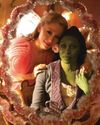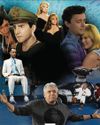David Attenborough’s new series is more than just another nature documentary

IT’S THE VOICE YOU NOTICE FIRST. IN person, David Attenborough speaks in the same awestruck hush he has used in dozens of nature documentaries, a crisp half whisper that is often mimicked but seldom matched. Ninety-two years of use may have softened its edges, but still it carries the command of authority. Sitting in his home in the Richmond neighborhood of west London for one in a series of conversations, I feel compelled to drink a second cup of tea when he offers. It somehow seems wrong to say no.
In his native U.K., Attenborough is held in the kind of esteem usually reserved for royalty. Over decades—first as a television executive, then as a wildlife filmmaker and recently as a kind of elder statesman for the planet—he has achieved near beatific status. He was knighted by the Queen in 1985 and is usually referred to as Sir David. As he walked into the Royal Botanic Gardens for TIME’s portrait shoot on the day of our interview, the mere sight of him caused members of the public and staff alike to break into goofy smiles.
Attenborough pioneered a style of wildlife filmmaking that brought viewers to remote landscapes and gave them an intimate perspective on the wonders of nature. Frans de Waal, the renowned Dutch primatologist, says he regularly uses clips from Attenborough’s shows in lectures. “He has shaped the views of millions of people about nature,” he says. “Always respectful, always knowledgeable, he takes us by the hand to show us what is left of the nature around us.”
この記事は Time の April 8, 2019 版に掲載されています。
7 日間の Magzter GOLD 無料トライアルを開始して、何千もの厳選されたプレミアム ストーリー、9,000 以上の雑誌や新聞にアクセスしてください。
すでに購読者です ? サインイン
この記事は Time の April 8, 2019 版に掲載されています。
7 日間の Magzter GOLD 無料トライアルを開始して、何千もの厳選されたプレミアム ストーリー、9,000 以上の雑誌や新聞にアクセスしてください。
すでに購読者です? サインイン

How Trump Won
THE FORMER PRESIDENT'S RE-ELECTION IS THE NEXT STEP IN A POLITICAL CAREER UNLIKE ANY OTHER IN AMERICAN HISTORY

Zak Brown The McLaren Racing CEO on Formula One in the U.S., his team's chase for a championship, and the future propulsion of the automobile
The McLaren F1 team is in the running for its first Formula One constructors' championship since 1998. What's that like? I'm kind of living on the edge of my seat. That's why sport is always going to be one of the most engaging forms of entertainment for people around the world.

Say Nothing speaks volumes
IN 1972, AT THE BLOODY HEIGHT OF the Troubles, home invaders abducted a widowed mother of 10 named Jean McConville from her Belfast apartment. Her children never saw her alive again.

Portrait of the artist in his ninth decade
AS A CURATOR AT THE PHILADELPHIA MUSEUM OF ART, Eleanor Nairne is very particular about how an artwork should be placed. \"I always say that you have to ask the work if it's sat comfortably,\" she says.

No rest for the songs of Wicked
THE WICKED WITCH OF THE WEST HAS BEEN A FIXTURE in American culture for nearly 125 years. After coming to life in 1900 with L. Frank Baum's novel The Wonderful Wizard of Oz, she rose to prominence onscreen in 1939, portrayed by Margaret Hamilton as a sinister old lady intent on ruining an innocent girl's wish to go home.

SENTIMENTAL VALUE
With Here, Robert Zemeckis stays true to his unlikely blend of new technologies and old-fashioned storytelling

TIME 100 CLIMATE
These are the 100 most influential leaders driving business climate action

BABY TALK
UNSURE ABOUT HAVING KIDS? THERAPIST MERLE BOMBARDIERI CAN HELP YOU FIGURE IT OUT

The many horrors of the Pelicot rape trial
THE TRIAL OF DOMINIQUE PELICOT, THE MAN IN THE South of France who pleaded guilty in September to charges of secretly drugging his wife of 50 years, Gisele, and, over the course of about a decade, filming dozens of men as they had sex with her while she was sedated, would have been disturbing enough just as the story of an epically vile husband.

Health Matters
COVID-19 MAY NOT BE A PUBLIChealth emergency anymore, but you still need your yearly shot. In fact, it seems to peak about twice a year: once during the traditional respiratory-disease season in the fall and winter, and once during summer.